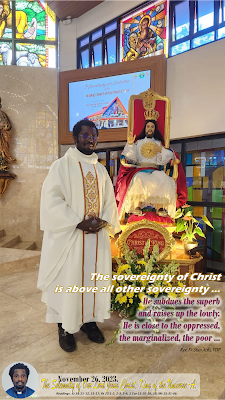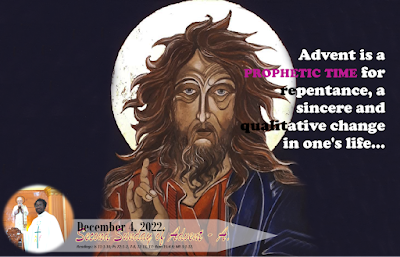THE SHEPHERD KING.
November 26, 2023.
The Solemnity of Our Lord Jesus Christ, King of the Universe
– A.
"And he will separate them one from another, as a
shepherd separates the sheep from the goats..."
A Sudanese proverb says: “A big chair does not make a king.”
And a Russian proverb adds: “Without the shepherd, sheep are not a flock.”
Christ is king. His Kingship is about caring, serving,
loving, and finally judging. To him belong all glory, sovereignty, power, and
honor. In truth, Christ's Kingship is of a totally different kind. He does not
reign to oppress but to serve and save. He is a shepherd king who cares for the
life of his sheep to the point of giving his own life for them. Having him as
the king of our lives, we are assured of wanting for nothing, sing the
Psalmist: “The Lord is my shepherd; there is nothing I shall want.” For, he
will lead us to the right and verdant pastures, defend us against our
adversaries, make us find repose to the restful waters, refresh our souls…
The sovereignty of Christ is above all other sovereignty.
Psalm 72:11-13 could help us reflect on which kind of king he is. It says: “May
all kings bow before him, all nations serve him. For he rescues the poor when
they cry out, the oppressed who have no one to help. He shows pity to the needy
and the poor and saves the lives of the poor.” He subdues the superb and raises
up the lowly. He is close to the oppressed, the marginalized, the poor.
We are celebrating today, the solemnity of Christ the King,
the end of the liturgical year A. This feast is a reminder and a call that
Christ must be in charge of our lives and that we must give him sovereign power
over us and over all we do, say, or have. That our whole being must be oriented
to sing his glory. Christ must reign in our lives and our hearts. This
solemnity reminds us also that while governments come and go, Christ reigns as
King forever. Jesus Christ “is very truth, and it is from him that truth must
be obediently received by all mankind” (Pope Pius XI, Quas primas, 7).
For this liturgical year A, the accent of the feast is put
on the image of the shepherd. In the first reading, the Prophet Ezekiel points
out the coming of a Good Shepherd. The shepherds of God’s people have dismayed
with the sheep entrusted to them. So, the Lord promises that he himself will
come, search for his sheep, and seek them out. He assures about how he will
care for them. And in the end, he will separate the sheep from the goats, the
good from the evil. He is a king to serve, not to be served. A king who cares
for, not to be cared for.
The image of the shepherd separating sheep from goats is
taken up by Jesus in the Gospel passage. The Lord portrays what the final
judgment could look like. He compares it with a shepherd's separating sheep
from goats. The analogy begins with the setting of decorum. The Son of God will
sit on his glorious throne, and all the nations will gather before him. It is
the image of the final great gathering, the judgment, the time when God will
reward the just and retribute the unjust. Pushing further, the Lord Jesus sets
the cause of the divine judgment. It will be based on the loving ministry of
feeding, clothing, caring for, assisting, and visiting the needy, namely the
sick and the prisoners (corporal works of mercy).
There is a kind of confusion expressed by both, the saved
and the damned: Lord, when did we see you and did this to you? Or Lord, when
did we see you and did not do it to you? And the Lord clarifies. He tells them,
and this is valid to you and me as well, that when we minister to others in
their needs, we minister to Him. When we refuse to minister to others in their
needs, it is the Lord we refuse to minister.
Listening to this parable and the clarifications given by
the Lord, it appears that the final judgment is not the fact of God but of man.
It is the individual choices and decisions we make today that will serve as
modules for our final judgment. We will be either at the right or at the left
because of what we did or what we failed to do.
Another fact that springs from the Gospel is that God will
not judge us on thousands of motives, but only one: love. As St. Paul could say
in Romans 13:8-10, “Love is the fulfillment of the law.” The final judgment is
the verdict of love. Those who love will live in God's kingdom. Those who fail
to love will be sentenced to eternal damnation.
While alive, the question each one seems to put is when will
the time come for that judgment? The truth is, not only no one knows the day or
the time, but also, the final judgment will not be a collective gathering. The
final judgment will first be an individual encounter between man and God. And
that encounter takes place at the hour of our death. At death, each one carries
with him the load of what he has done, and it is on this he is judged. Death
leads us "to behold God face-to-face." So, as we are still alive,
this is the time to get ready for this encounter.
May we keep this in mind, the Feast of Christ the King has an eschatological dimension. It points to the end of time when the kingdom of Jesus will be established in all its fullness to the ends of the earth. And in addition, it leads us into Advent, when the Church anticipates Christ's second coming. Are we ready for this second coming? Will we be among those at his right or those at the left?





Comments
Post a Comment